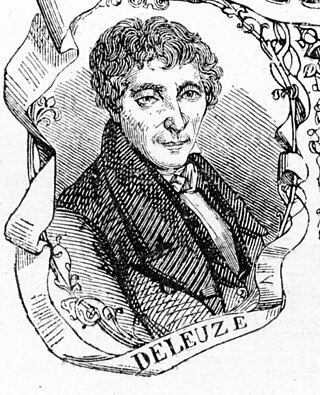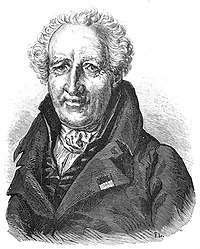
The Prix de Rome or Grand Prix de Rome was a French scholarship for arts students, initially for painters and sculptors, that was established in 1663 during the reign of Louis XIV of France. Winners were awarded a bursary that allowed them to stay in Rome for three to five years at the expense of the state. The prize was extended to architecture in 1720, music in 1803 and engraving in 1804. The prestigious award was abolished in 1968 by André Malraux, then Minister of Culture, following the May 68 riots that called for cultural change.

The Council of Ancients or Council of Elders was the upper house of the French legislature under the Constitution of the Year III, during the period commonly known as the Directory, from 22 August 1795 until 9 November 1799, roughly the second half of the period generally referred to as the French Revolution.

François Auguste Péron was a French naturalist and explorer.
La Loge des Neuf Sœurs, established in Paris in 1776, was a prominent French Masonic Lodge of the Grand Orient de France that was influential in organising French support for the American Revolution. A "Société des Neuf Sœurs," a charitable society that surveyed academic curricula, had been active at the Académie Royale des Sciences since 1769. Its name referred to the nine Muses, the daughters of Mnemosyne/Memory, patrons of the arts and sciences since antiquity, and long significant in French cultural circles. The Lodge of similar name and purpose was opened in 1776, by Jérôme de Lalande. From the start of the French Revolution in 1789 until 1792, Les Neuf Sœurs became a "Société Nationale".
The Baudin expedition of 1800 to 1803 was a French expedition to map the coast of New Holland. Nicolas Baudin was selected as leader in October 1800. The expedition started with two ships, Géographe, captained by Baudin, and Naturaliste captained by Jacques Hamelin, and was accompanied by nine zoologists and botanists, including Jean-Baptiste Leschenault de la Tour, François Péron and Charles-Alexandre Lesueur as well as the geographer Pierre Faure.

The Roman Catholic Diocese of La Rochelle and Saintes is a diocese of the Latin Church of the Catholic Church in France. The diocese comprises the département of Charente-Maritime and the French overseas collectivity of Saint-Pierre and Miquelon. The bishop is a suffragan of the Archbishop of Poitiers. The episcopal seat is in La Rochelle Cathedral. Saintes Cathedral is a co-cathedral.
During the French Revolution, a constitutional bishop was a Catholic bishop elected from among the clergy who had sworn to uphold the Civil Constitution of the Clergy between 1791 and 1801.
The Société des Antiquaires de France is a Parisian historical and archaeological society, founded in 1804 under the name of the Académie celtique. It is now based at the Louvre, in the pavillon Mollien.
The Commission des Sciences et des Arts was a French scientific and artistic institute. Established on 16 March 1798, it consisted of 167 members, of which all but 16 joined Napoleon Bonaparte's campaign in Egypt and produced the Description de l'Égypte. More than half were engineers and technicians, including 21 mathematicians, 3 astronomers, 17 civil engineers, 13 naturalists and mining engineers, geographers, 3 gunpowder engineers, 4 architects, 8 artists, 10 mechanical artists, 1 sculptor, 15 interpreters, 10 men of letters, 22 printers in Latin, Greek and Arabic characters. Bonaparte organised his scientific 'corps' like an army, dividing its members into 5 categories and assigning to each member a military rank and a defined military role beyond his scientific function.

The Military governor of Paris is a post within the French Army. He commands the garrison of Paris and represents all the military based in Paris at high state occasions. He is also responsible for organizing major national ceremonies such as the Bastille Day military parade down the Champs-Élysées.

The Académie des Sciences, Belles-Lettres et Arts de Rouen is a learned society created by letters patent of Louis XV on 17 June 1744.
Jean Joseph Victor Génissieu was a French lawyer and politician who was in turn president of the National Convention, Minister of Justice and president of the Council of Five Hundred during the French Revolution.

Louis-François Jauffret was an 18th–19th-century French educator, poet and fabulist. Gaspard-André Jauffret, bishop of Metz, Jean-Baptiste Jauffret, director of the imperial institution of the deaf in St. Petersburg and Joseph Jauffret, master of requests to the Conseil d'État, were his brothers.
Pierre-Roland-François Butet de La Sarthe was a French grammarian and lexicographer.
Pierre Ange François-Xavier Faure was a French geographer who participated in the expedition to the South Seas that Nicolas Baudin led between 1800 and 1803 and that was back in March 1804 in Lorient.

Joseph-Philippe-François Deleuze was an 18th–19th-century French naturalist.

Louis-Augustin Richer was a French singer, singing professor and composer. He was a member of a family of musicians from Versailles who also had close ties to the family of André Danican Philidor. He gained prominence as a singer at the courts of Louis XV and Louis XVI and also served as Maître de musique for the courts of the Duke of Chartres and the Duke of Bourbon. After the abolition of the monarchy during the French Revolution, Richer became a professor at the Paris Conservatory.













